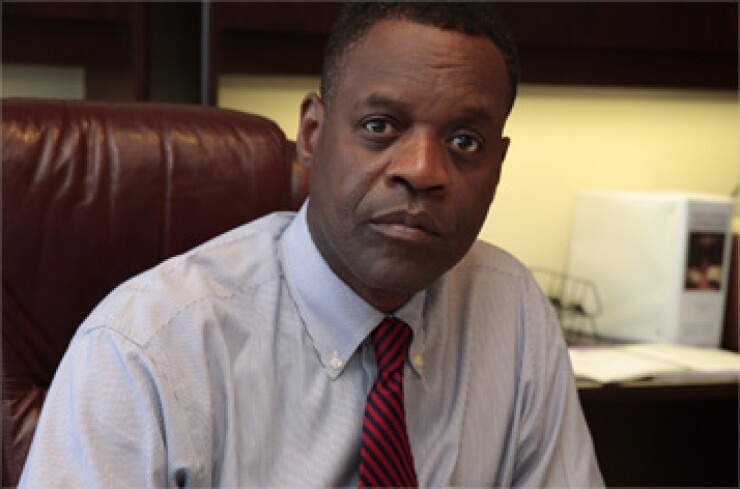
Kevyn Orr looked out at the municipal bond market audience in New York and said Detroit is vastly improved from 2013, when it filed for bankruptcy.
"I hope you buy early and I hope you buy often," Orr, eliciting laughter, said of the Motor City's $245 million bond sale planned for next month.
Then Orr turned serious.
Speaking at a Municipal Securities Rulemaking Board seminar co-sponsored by the Municipal Forum of New York, Detroit's former emergency manager rattled off numbers - not the percents, yields and volume that often accompany these conferences, but the human kind.
As Detroit plummeted to bankruptcy, he said, response time to the highest priority police and emergency medical calls averaged 45 minutes to an hour; tax collection was at 65%; 75% of parks were closed; and 72 water main breaks occurred in one day last August.
Bankruptcy Judge Stephen Rhodes called the country's largest municipal bankruptcy a "service-delivery insolvency."
The city, less than a year after ending its 17-month stay in Chapter 9, plans its first post-bankruptcy bond sale for Aug. 19, a roughly $245 million issuance to repay Barclays for a loan that enabled the city to exit last December.
"Detroit's a much better credit than it was two years ago," Orr said in an interview after his speech at the Sheraton Hotel in lower Manhattan. Asked if anything about the city's recovery keeps him awake at night, including the prospect of resuming pension payments 10 years from now that Detroit might not be able to afford, he shook his head.
"We built enough of a surplus," he said. "They should be fine."
Orr, an African-American and self-described "long-term liberal Democrat," worked with Republican Gov. Rick Snyder to help guide the city through the Chapter 9 process, fending off worries that ranged from retirees frightened of losing their pensions to suburban Michigan lawmakers who long wrote off Detroit as a lost cause. "It was a 60-year problem," said Orr. "People didn't want to take on Detroit. It was a third rail."
Detroit, said Orr, became a metaphor for ills, domestic and foreign. One British journalist, he said, asked him if Detroit's plight was "an allegory on the fall of U.S. capitalism."
Orr also persevered amid frequent calls for civil unrest, in a city known all too well for its race riots of the 1960s.
"Eighty-five percent of the world is in a distressed environment. We live on a thin edge, a very thin edge. Things can change overnight like that," he said, snapping his fingers. "Look at Baltimore, Ferguson and other places."
A Florida native, Orr also remembered Miami's race riots of the early 1980s. "That would have been the story of Detroit for decades. It was in the forefront of my mind that this cannot be the story."
Orr, a partner at law firm Jones Day in Washington and a University of Michigan law school graduate, worked briefly with distressed Atlantic City, N.J. - he sees no comparisons between that city and Detroit - and is confident that Atlantic City can bounce back.
"They have a highly capable team," he said of Gov. Chris Christie and current Christie-appointed emergency manager Kevin Lavin. "Everyone needs to get to the table."
Atlantic City officials last week said has enough cash to meet its August general obligation debt service payments and expects to have sufficient liquidity through October, according to city officials. Moody's Investors Service called the development a credit positive.
Asked to comment about remarks by Rhodes that teetering Puerto Rico is "exactly like Detroit," Orr hesitated, then grinned.
"Judge Rhodes is a pretty bright guy. He knows what he's talking about."





